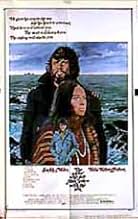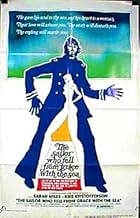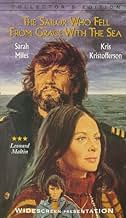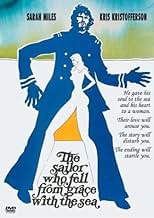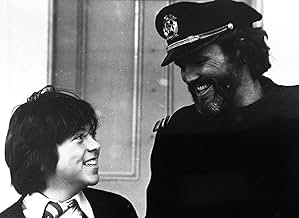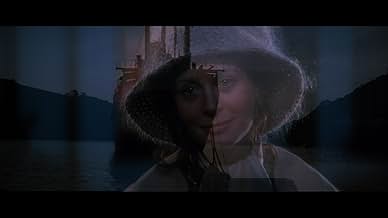IMDb RATING
6.2/10
1.8K
YOUR RATING
After his father dies, a disturbed young boy plots to take revenge on the new man in his mother's life.After his father dies, a disturbed young boy plots to take revenge on the new man in his mother's life.After his father dies, a disturbed young boy plots to take revenge on the new man in his mother's life.
- Director
- Writers
- Stars
- Awards
- 2 nominations total
Charles Adey-Grey
- Man in Tea Room
- (uncredited)
Mabel Etherington
- Woman in Tea Room
- (uncredited)
Juba Kennerley
- Man in Tea Room
- (uncredited)
- Director
- Writers
- All cast & crew
- Production, box office & more at IMDbPro
Featured reviews
This is a very chilling movie based on an even more chilling novel. It does seem to be a cross between "Oedipus Rex" and "Lord of the Flies" as some reviewers have astutely pointed out, but it is actually based on an obscure Japanese novella. The original story had a Japanes protagonist and was set in a Japanese fishing village. The filmmakers don't entirely succeed in transplanting the action to rural England and casting a Kris Kristoferson in the lead role, but an international film never could have gotten made at the time with a Japanese lead, and once they cast Kristoferson, setting the movie in a Japanese fishing village would have drawn the inevitable charges of racism from the perpetually outraged idiots in the "PC" crowd.
Besides the awkwardness of the adaptation is redeemed by some great acting. This is probably Kristoferson's second best role after "Pat Garret and Billy the Kid". Sarah Miles is also very good as the lonely widow. Her sex scenes with Kristoferson are very erotic if very perverse (you see them only through a peephole as her disturbed son watches). The British child actors are also very good for a change, particularly the very disturbed but nevertheless sympathetic son and the truly psychopathic leader of the gang of schoolboys he runs with (who make the "Children of the Damned" look cute and cuddly by comparison). The scene where the gang eviscerates a live cat is almost unbearable to watch. And the final scene on a hill overlooking the sea is chilling, tragic, fatalistic, beautiful, and mythic all at once. This is and haunting and unforgettable movie.
Besides the awkwardness of the adaptation is redeemed by some great acting. This is probably Kristoferson's second best role after "Pat Garret and Billy the Kid". Sarah Miles is also very good as the lonely widow. Her sex scenes with Kristoferson are very erotic if very perverse (you see them only through a peephole as her disturbed son watches). The British child actors are also very good for a change, particularly the very disturbed but nevertheless sympathetic son and the truly psychopathic leader of the gang of schoolboys he runs with (who make the "Children of the Damned" look cute and cuddly by comparison). The scene where the gang eviscerates a live cat is almost unbearable to watch. And the final scene on a hill overlooking the sea is chilling, tragic, fatalistic, beautiful, and mythic all at once. This is and haunting and unforgettable movie.
This movie is morbid but is quite faithful to the original story. And it uses its Dover location very effectively in showing a place isolated in its own mythology.
The story is about a fatherless adolescent boy who is himself very much like the sea. He is restless and calm and seemingly untameable. All the confusion and frustrations of adolescence are portrayed here in an honesty that no other movie has ever dared to show. The restless urge to be a grown up and to move on to a life of daring excitement, and the desire to find a philosophy and a poetry to which one can ascribe are all explored in an uncompromising way in this film.
Desperate for an authority and leadership that he can look up to, the boy finds himself vying for the acceptance of a sadistic boy with a Nietzsche complex who uses a strain of hierarchy in his little band of friends in order to maintain control. Soon Kristofferson shows up and as he seems to be the stuff of oceanic legends, the boy finds a new hero to worship.
I would not even attempt to give the ending away. Suffice it to say that this is a most disturbing film in its subject matter and for those with short attention spans, it may seem slow in its pace. But like the sea, the film is languid in its pacing and it promises the same degree of poetry and savagery.
Fascinating viewing!
The story is about a fatherless adolescent boy who is himself very much like the sea. He is restless and calm and seemingly untameable. All the confusion and frustrations of adolescence are portrayed here in an honesty that no other movie has ever dared to show. The restless urge to be a grown up and to move on to a life of daring excitement, and the desire to find a philosophy and a poetry to which one can ascribe are all explored in an uncompromising way in this film.
Desperate for an authority and leadership that he can look up to, the boy finds himself vying for the acceptance of a sadistic boy with a Nietzsche complex who uses a strain of hierarchy in his little band of friends in order to maintain control. Soon Kristofferson shows up and as he seems to be the stuff of oceanic legends, the boy finds a new hero to worship.
I would not even attempt to give the ending away. Suffice it to say that this is a most disturbing film in its subject matter and for those with short attention spans, it may seem slow in its pace. But like the sea, the film is languid in its pacing and it promises the same degree of poetry and savagery.
Fascinating viewing!
It's a compelling, morbid film most of the time - but what's up with the ending? It builds up (competently and suspensefully) to a situation that can easily be guessed right from the beginning, and then....it just stops, as if being afraid of going "too far". Perhaps the novel ends the same way, but in this movie it doesn't work - it renders the whole film pointless. The hyped-up erotic scenes are brief and too darkly photographed, but the performances are right on target. (**1/2)
An unforgettable and profoundly disturbing story centered on a widow, Anne, and her only son, Jonathan, in a remote English seaside town. Jonathan belongs to a gang led by a precociously intelligent sociopath known only as Chief, who through sheer force of will and intellect, indoctrinates them with a quasi-Neitzchean philosophy of ultimate superiority and the non-existence of morality. When Kris Kristofferson's Captain Jim arrives in town, and strikes up a passionate relationship with the lonely Anne, Jonathan sees him as a heroic masculine prototype, removed from society and living a 'true' life on the open sea. But when the Captain decides to settle down and marry Anne, Jonathan takes it as an ultimate and unforgivable betrayal, and exacts a terrible revenge.
Based on the 1963 Mishima novel, "The Sailor Who Fell From Grace With The Sea" hints at many themes, from Jonathan's Oedipal obsession with spying on his mother's bedroom to his physical admiration of the Captain that verges on latent homosexuality. The atmosphere, masterfully created by veteran cinematographer Douglas Slocombe, is one of darkly brooding clouds, gray seas, and an air that constantly threatens rain. The (in)famous sex scenes are really not that explicit, and the casual violence exhibited by the children is far more shocking than any glimpse of breast or buttock.
The film, for all its brilliantly evocative atmosphere, excellent performances, and quietly brooding menace, is not without its flaws. The score is terrible, all mawkish piano and sickly clarinet. It is often overly intrusive and distracts from the overall sense of ripe stillness that director Carlino conjures throughout the film. But in general, the film is a remarkable experience, and one that any viewer is unlikely to forget quickly.
Based on the 1963 Mishima novel, "The Sailor Who Fell From Grace With The Sea" hints at many themes, from Jonathan's Oedipal obsession with spying on his mother's bedroom to his physical admiration of the Captain that verges on latent homosexuality. The atmosphere, masterfully created by veteran cinematographer Douglas Slocombe, is one of darkly brooding clouds, gray seas, and an air that constantly threatens rain. The (in)famous sex scenes are really not that explicit, and the casual violence exhibited by the children is far more shocking than any glimpse of breast or buttock.
The film, for all its brilliantly evocative atmosphere, excellent performances, and quietly brooding menace, is not without its flaws. The score is terrible, all mawkish piano and sickly clarinet. It is often overly intrusive and distracts from the overall sense of ripe stillness that director Carlino conjures throughout the film. But in general, the film is a remarkable experience, and one that any viewer is unlikely to forget quickly.
I really enjoyed this movie back when it came out in 1976. It never showed up at the major theaters though. I saw it in one of the Dollar theaters. How it got away with an R rating back then I will never know. I had seen x-rated movies that had showed less. And the love scenes were a spread in Playboy. My girlfriend said is was because it had a plot. I do remember she was in a state of shock when we left. She was an 18 year old Southern Bapist Sunday School teacher at the time. Kris Kristofferson was never highly rated as an Actor but I think he did an excellent job in this movie. The child actors were completely believable. It was written by a Japanese gentleman and I am amazed at how well some examples of Japanese literature and movies translate to the US. The Magificent Seven ( AKA the Seven Samarai) and " A fistful of Dollars".
If you can find it on DVD I would highly recommend it.
If you can find it on DVD I would highly recommend it.
Did you know
- TriviaFirst English language filmed adaptation of a novel by Japanese writer Yukio Mishima.
- Alternate versionsUS DVD version is cut. Sex scenes of Sarah Miles are tamed down in US version.
- ConnectionsReferenced in Fantasm Comes Again (1977)
- How long is The Sailor Who Fell from Grace with the Sea?Powered by Alexa
Details
Contribute to this page
Suggest an edit or add missing content

Top Gap
By what name was The Sailor Who Fell from Grace with the Sea (1976) officially released in India in English?
Answer
